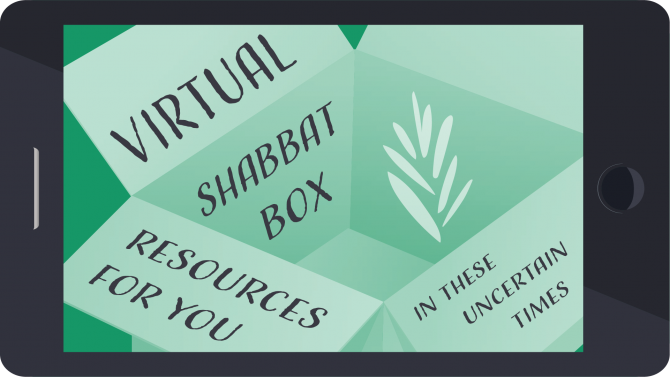

Gabrielle Kaplan-Mayer has started this daily practice of lighting a candle and taking a few moments to send loving thoughts to those in need. Sourced from Ritualwell
Taste a sweet juicy pomegranate and the taste of freedom with this spoken word meditation by Rabbi Alex Weissman. Sourced from Reset: Resilience Practices for Jewish Social Justice Organizations
When we find it hard to rest on the “Day of Rest,” this meditation by Devon Spier can help us find a start by simply catching up with our breath. Sourced from Ritualwell
Despite our best intentions, there are things that we still do not see. In this essay, Rabbi Sandra Lawson and rabbinical student Donna Cephas examine the assumption that all Jews are white, while touching on myriad interrelated issues: conversion, interracial families, adoption, Ashkenazi privilege and political correctness. Sourced from Evolve: Groundbreaking Jewish Conversations
This liturgical poem (piyut) by Alexander Massey is an expanded midrashic interpretation/translation of the first two lines of the Shema. It expands our understanding of the Torah’s command for us to listen and hear. Sourced from Ritualwell
Rabbi Jacob Staub talks about one of the deepest and best-known of Jewish practices: Shabbat. We read about this ancient practice in Genesis, with God creating the world in six days and then resting on the seventh — and from that, we get the concept of a day of rest. Sourced from Hashivenu: Jewish Teachings on Resilience
Join Rabbi Vivie Mayer in a sweet song of holding on to the taste of Shabbat and the longing for better things. Sourced from Reset: Resilience Practices for Jewish Social Justice Organizations
Our hands and feet are the tools of our weekday work. This Shabbat, take time just to be aware of them and of the Energy that enlivens their working. Sourced from Reset: Resilience Practices for Jewish Social Justice Organizations
The “covenant of salt,” Rabbi Rena Blumenthal writes, is the agreement that Jews will not only bear witness to suffering and destruction, but preserve memories of pain to teach to future generations. Sourced from Evolve: Groundbreaking Jewish Conversations
Deep belly breaths connect us to nishmat kol hai, the Breath of Life that animates all creation. Sourced from Reset: Resilience Practices for Jewish Social Justice Organizations
In this poem Devon Spier reminds us to behold anew the light of Shabbat and all that it illuminates for us. Sourced from Ritualwell
These blessings were written to be used on Erev Shabbat. Their timing is meant to parallel the blessing of children, as our pets are certainly a part of our families. Sourced from Ritualwell
Dr. Tamar Kamionkowski shares a biblical response to contagion: self-quarantine voluntarily, even if you personally have nothing to gain from doing so, for the good of the community. Sourced from Evolve: Groundbreaking Jewish Conversations
Let us drink deeply from the mayyim hayyim, the living waters of Miriam’s Well. As we drink, may we find sustenance from God’s healing powers and strength for the coming week. Sourced from Ritualwell
In her poem, Suzanne Sabransky reminds us that while most everything in life is fleeting and uncertain, we can count on Shabbat as a soothing and healing presence that will return to us each and every week. Sourced from Ritualwell
Today, many workers risk their well-being to bring food to our tables. And now they have begun raising their voices to ensure safer conditions. Maharat Dasi Fruchter’s teaching focuses our intention on buying food that has been produced with special sensitivity and minimal harm to workers. We, too, raise our voice for safety for the brave who bring food to our tables. Sourced from Ritualwell
Rabbi Alex Weissman’s spoken word meditation walks you through the experience of creation. Meet the angels, sing “kadosh, kadosh, kadosh — holy, holy, holy.” Come upon a pure dark night, then morning comes with “new smells — the saltwater, the freshwater, the rivers, the lakes, the ponds, the oceans and the seas; this is good. Praise Yah. Praise Creation.” Sourced from Reset: Jewish Practice for Activists
There is much radiance to be seen, even when we are surrounded by darkness. Poet Cathleen Cohen shows us how. Sourced from Ritualwell
Focus on both the sounds coming from your surroundings and your own body as this meditation led by Rabbi Sheila Weinberg helps you re-center and imagine yourself as a part of something much larger. Sourced from Reset: Resilience Practices for Jewish Social Justice Organizations
No matter how many times we tell it, the Exodus story continues to move us, connect us, and help us make meaning of our experiences and those of our ancestors. Dr. Elsie Stern explores some of the story’s meanings in biblical times and today. Sourced from Recon Connect Beit Midrash
Redemption, heralded by Eliyahu ha-Navi/Elijah the Prophet, did not appear this Shabbat. And so, as Rabbi David E. S. Stein teaches us, we sing once more, that maybe next Shabbat we can say “Elijah comes tonight.” Sourced from Ritualwell
In these times, anxiety can become all-consuming. We welcome the opportunity that Shabbat gives us to pause to reflect, to refuel, and to rededicate ourselves to spreading compassion and care. A healthy and renewing Shabbat shalom to us all.